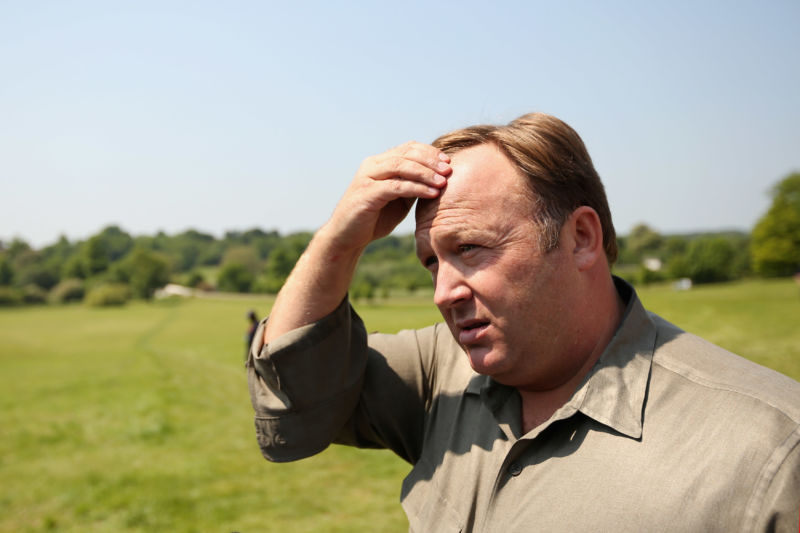
Update: This article originally stated that Facebook had not banned most Alex Jones content from the site, which was true when we scheduled the post on Friday afternoon. But on Monday morning, shortly before this article published, Facebook removed four key Alex Jones pages, effectively banning him from the platform. I've updated the story to reflect this change.
Facebook and YouTube both have strict rules against posting content that is hateful, pornographic, or violates someone's privacy. But what if someone posts content that is just egregiously false? Right now, neither Facebook nor YouTube has rules banning this kind of content. And critics say that's a problem.
In recent weeks, the issue has come to a head over online provocateur, pundit, and conspiracy theorist Alex Jones. Jones gleefully flouts the rules of journalistic ethics, regularly making outrageous claims without a shred of evidence.
“When I think about all the children Hillary Clinton has personally murdered and chopped up and raped, I have zero fear standing up against her,” Jones said in one YouTube video.
Last month, Facebook and YouTube both removed a few of Jones' videos, including that one quoted above, citing rules against harassment, bullying, child endangerment, or hate speech. At the end of July, Facebook suspended Jones' account for 30 days, while YouTube recently took down four videos.
Then on Monday morning, Facebook banned four of the main pages Alex Jones uses to post content, effectively banning Jones from the platform. But notably, Facebook banned the pages for violating rules against violence and hate speech—not fake news. Facebook continues to insist that fake news, by itself, is not a basis for removing content from the platform.
"We don't remove false news from Facebook, but instead significantly reduce its distribution by showing it lower in the News Feed," Facebook says in its content guidelines.
For some perspective, I talked to two experts who have thought a lot about the problem of fake news online. And neither one of them was able to offer a compelling alternative to Facebook's current approach.
"All of these social media platforms will make all these speeches and press releases that they're really committed to ending disinformation on their platform, but they're not really," said Alice Marwick, a communications professor at the University of North Carolina, Chapel Hill. "If they are committed to disinformation, they do have to kick Alex Jones."
Yet she wasn't entirely comfortable with that approach. "Do they want to be the arbitrators of truth?" she asked. "We probably don't want that."
Booting someone like Jones from Facebook or YouTube altogether could easily turn him into a martyr among his paranoid fans. And policing content for factual accuracy could suck platforms into endless controversies over hot-button political issues. So as unsatisfying as Facebook's approach is, it might be the best of some bad options.
"I think that using algorithms to personalize and filter, as much as it's gotten a bad rap, is probably healthier than saying this thing is available or not available," argued James Grimmelmann, a law professor at Cornell University.
Alex Jones, troll and conspiracy theorist
Facebook and YouTube have helped Jones amass a huge online audience for his website Infowars. Jones has 2.4 million YouTube subscribers and 1.6 million followers on Facebook. He has built that audience by constantly peddling nonsense.
In one rant, Jones claimed that Hillary Clinton and Barack Obama are literal demons. "Obama and Hillary both smell like sulfur," as Jones put it in the final weeks of the 2016 election.
Also in 2016, Jones repeatedly touted "Pizzagate," a conspiracy theory that involved prominent Democrats running a child sex ring from the basement of a Washington, DC, pizzeria (as it turned out, the restaurant doesn't even have a basement). Pizzagate rumors online prompted one Alex Jones fan to drive to Washington, DC, and stage an armed confrontation.
Jones has promoted outrageous conspiracy theories unrelated to Democratic politicians, too. He has claimed that a number of recent mass shootings, including the 2012 shooting at Sandy Hook Elementary School, were false-flag operations organized by the government. That claim got Jones sued by some Sandy Hook parents.
Jones claims that the government "can create and steer groups of tornadoes" to use as weapons. He predicted that Lady Gaga would perform a satanic ritual in the 2017 Super Bowl halftime show.
So when Facebook executives met with a group of journalists last month to tout the platform's battle against fake news, Jones' name came up, according to CNN:
When asked by this reporter how the company could claim it was serious about tackling the problem of misinformation online while simultaneously allowing InfoWars to maintain a page with nearly one million followers on its website, [Facebook's] Hegeman said that the company does not "take down false news."
Other media outlets quickly piled on, pressuring Facebook to cut ties with Jones. YouTube faced pressure over hosting Jones as well. Soon afterward, both platforms blocked some of the most egregious videos from Jones' site—videos the platforms said violated pre-existing rules not directly related to fake news.
All the while, Facebook stuck to its guns when it came to the question of becoming the fake news police.
"We see pages on both the left and the right pumping out what they consider opinion or analysis—but others call fake news," the company tweeted. "We believe banning these pages would be contrary to the basic principles of free speech."
reader comments
512